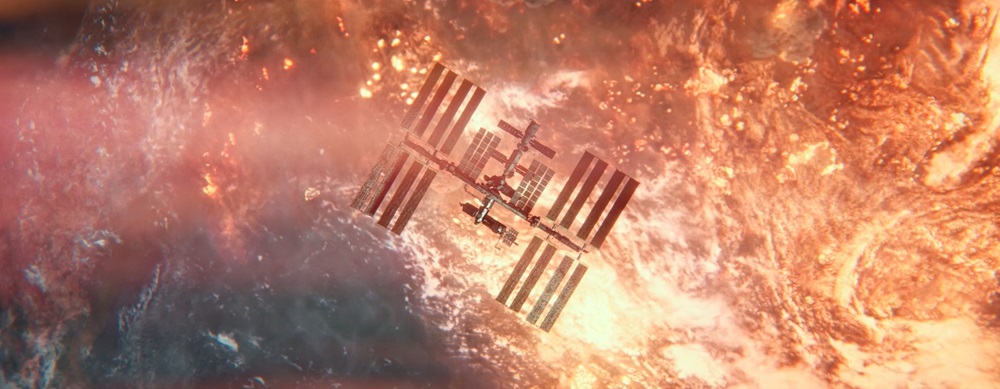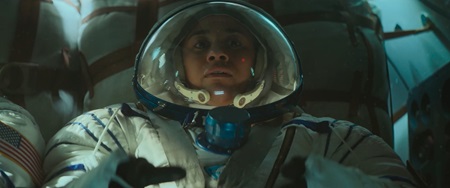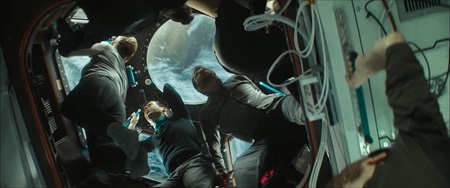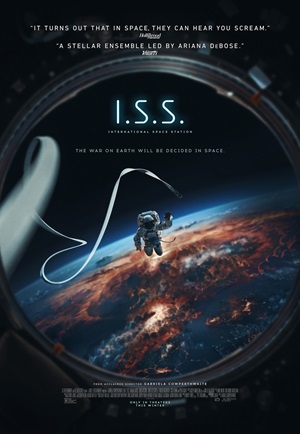
Unsettlingly Timely I.S.S. has the Right Stuff
Not even two days into her tenure aboard the International Space Station (I.S.S.), astronaut Dr. Kira Foster (Ariana DeBose) peers out an observation deck window, looking toward the Earth, and sees a hellish spectacle. A series of gigantic explosions begin to ripple across the surface of the planet. It is as if the land itself is inexplicably bursting into flame. I.S.S. commanding officer Gordon Barrett (Chris Messina) immediately orders the six-person crew — split evenly between the United States and Russia — to look away, certain their respective governments will inform them of what is going on as soon as they can.
He’s right about that. Within seconds, both he and his Russian counterpart Nicholai Pulov (Costa Ronin) are contacted by their superiors. But before either can respond, communications are inexplicably cut off, and all they have to go on are the almost identical messages they’ve received: Take control of the I.S.S. by any means necessary.
That’s all there is to I.S.S., the unsettlingly timely new thriller from Blackfish and Our Friend filmmaker Gabriela Cowperthwaite. Newcomer Nick Shafir‘s efficient script is a model of simplicity. There is little in the way of exposition. Nothing is overexplained. Instead, the filmmakers insist on letting the audience slip their way into the proceedings as a seventh protagonist, every viewer asked nothing more (and certainly nothing less) than how they believe they would act and react if they’d been thrust into a similar situation.
This all works best during the film’s sensational opening half. The introduction to the astronauts, a group that also includes John Gallagher Jr. as gregarious American scientist Christian Campbell and Pilou Asbæk and Masha Mashkova as Russian cosmonauts Alexey Pulov and Weronika Vetrov, is handled with pitch-perfect brevity. The initial tour of the I.S.S. that Commander Barrett gives Dr. Foster allows the viewer to get a firm grasp of the small space’s layout almost immediately. The first look at the Earth through the observation deck window is awe-inspiring.
Then there is the catastrophic event itself. Cowperthwaite returns to her observational documentarian roots with bravura authority. She strips out almost all of composer Anne Nikitin‘s otherwise disquietingly sincere score. The film’s uncomfortable sound design goes almost entirely silent. All that matters is the grotesque orange, red, and yellow horror slowly enveloping the Earth, and I felt as if Cowperthwaite was forcing me to take it all in without any unnecessary embellishment or didactic sermonizing on her end. It’s gloriously terrifying.
From there, things mostly play out as anticipated. The crew begins to wonder who they can trust. Each astronaut has to decide whether or not the orders they have received are valid. Tensions rise. Suspicions go into overdrive. Paranoia puts all of their lives in danger, and ultimately Dr. Foster — as the only newcomer to the group — is the one who has to make the pivotal life-or-death decisions that could decide not just the fate of the I.S.S. but the Earth itself, too.
Some of that gets a bit convoluted and nonsensical. There’s also a McGuffin regarding a “cure” for radiation poisoning that is the real reason both the United States and Russia want their astronauts to seize the I.S.S. Commander Barrett makes a bizarre decision early on to go on a potentially dangerous spacewalk solo that honestly does not make a ton of sense, and while there is dramatic resonance to this course of action, its overall lack of believability significantly dilutes that. As for the ending, it’s something of a foregone conclusion, and that’s a shame.
But none of this keeps the film from working. The ensemble is excellent across the board, especially DeBose and Asbæk, both of whom bring an internalized complexity to their characters that’s striking. Cowperthwaite stages a small handful of knockout sequences, not the least of which is a zero-gravity fistfight that caught me by surprise and is chilling in its bloodcurdling minimalism. The film is also compellingly shot by cinematographer Nick Remy Matthews (Hotel Mumbai), his camera navigating all the compact and cramped ins and outs of the I.S.S. similarly to classic submarine dramas like Das Boot or Crimson Tide.
Ultimately, I.S.S. asks several troubling and unpleasant questions, and the film refuses to make things easy on the audience by smothering them in obvious answers. This is a sci-fi procedural “what if” scenario straight out of The Twilight Zone or Black Mirror. While it isn’t quite out of this world, it does have the right stuff, and just like how Chuck Yeager breaking the sound barrier got everyone eager to discover what else was humanly possible, that’s more than enough for me to get excited about whatever it is that Cowperthwaite or Shafir decide to make next.
– Review reprinted courtesy of the SGN in Seattle
Film Rating: 3 (out of 4)








